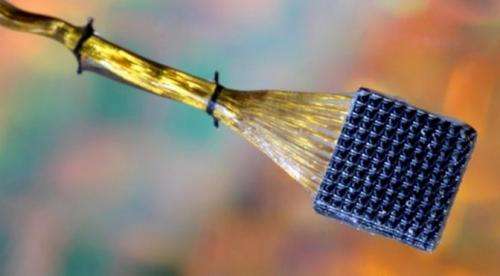April 9, 2013 report
The Fat Chip: Controlling obesity the smart way

(Medical Xpress)—Gastric banding, a common surgery to reduce obesity, leaves much to be desired. Typically, the patient is left with a feeling of constant hunger. Stimulators implanted in the feeding centers of the brain, like the hypothalamus, have met with mixed results. Partly that is to be expected since there is considerable functional overlap within those areas, and also due to the limited resolution that can be obtained with implanted electrodes in bulk brain tissue. Doctors have also tried to stimulate the main trunk of the vagus nerve, the largest nerve in the body. The vagus nerve, however, hits all the major organ systems, not least being the heart. It also provides two-way channels of communication throughout its extent. Researchers in the U.K. , led by Chris Toumazou, have developed a nerve cuff electrode that targets the branch of the vagus that ennervates the gut. The controller can apparently read conditions in the stomach and provide signals of satiety to the brain with proper stimulation.
Controlling the body through targeted stimulation has had widespread success. In much the same way that orthopedics device makers have a full replacement line, or splinting option, available for nearly every bone in the body, stimulator makers now see the entire nervous system as an open market. For example the new ATI Neurostimulation System, developed by Autonomic Technologies Inc. is custom-designed for the facial anatomy. It comes with a patient-commanded remote controller and specifically targets the sphenopalatine ganglion to relieve certain kinds of headache.
The vagus, which means to wander, is not just a nerve but a whole network unto itself. About 80-90 percent of its nerve fibers are said to be afferent (sensory) nerves, which communicate visceral state to the brain. The left and right main nerve trunks have many intertwined pathways that split and reconnect in a meshwork that extends down the esophagus before it even gets to the stomach. If you look at the nerve though, it seems like many of the anastomosing fibers appear to go nowhere. They frequently loop back in the direction from whence they came, perhaps sensing things like stretch or chemical environment along their extent. Surgically cutting the nerve has the undesirable side effect of causing vitamin B-12 deficiency. Normally, the vagus stimulates the parietal cells of the stomach to secrete factors which aid in absorption of the vitamin. Considering the many important functions of the vagus, it seems choosing the exact spot to place the cuff should not be taken lightly.
Throughout his career, Toumazou has been a pioneer in using low-power analog devices for sensing and control. His designs include the first totally implantable cochlear stimulator to restore hearing. His device for controlling obesity reportedly can sense conditions in the stomach and then fool the brain into thinking it is full. Ideally, the device will be tuned to give a fitting sense of fullness rather than a feeling of completely distended belly or associated nausea. However, nobody today has succeeding in cracking a neural code, not even for a predictable system like the retina. Even the existence of such a code within neural systems is a matter for a rather technical discussion.
A nagging void in the proposed operation of the new device is a clear description of exactly how it works. Some things, like whether the stimulation has its major effect through net excitation or subsequent inhibition of the nerves that signal satiety, are still unknown. The same can be said for the effect of stimulation on nervous control of digestive enzyme secretion. Others factors, like how the device "senses the chemical messages from the nerves leaving the stomach" seem slightly at odds with the current understanding of nerves as passive relays of messages sensed at their terminations. Researchers certainly know the exact chemicals and methods used by the chip, however they were not available for comment on this point.
The team has a good track record in the field, having already developed vagus nerve stimulators to treat epilepsy, and also an efficient analog chip designs to control them. Successful trials of these kinds of devices would give surgeons a valuable tool to treat those patients for whom every other method has seemingly failed.
More information: Electronic implant designed to reduce obesity to undergo trials (BBC)
© 2013 Medical Xpress















